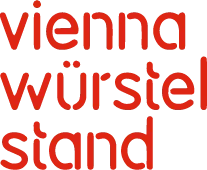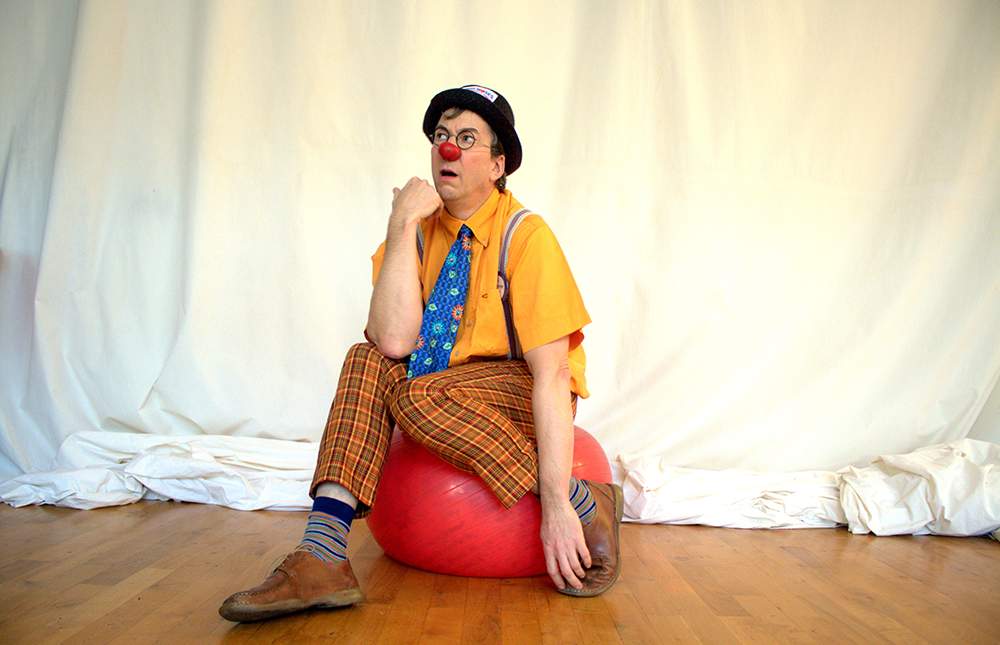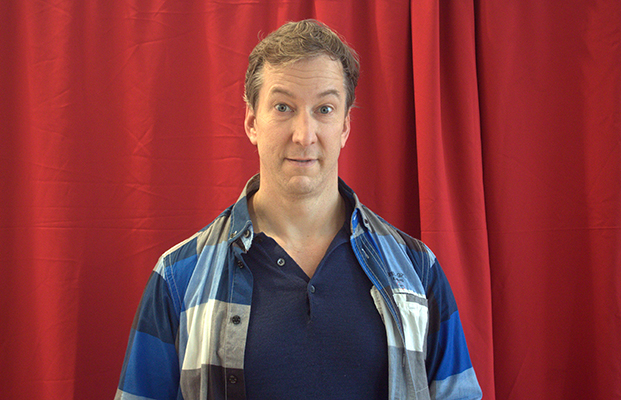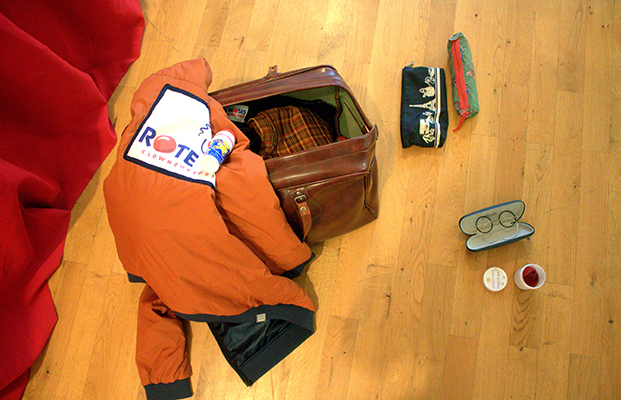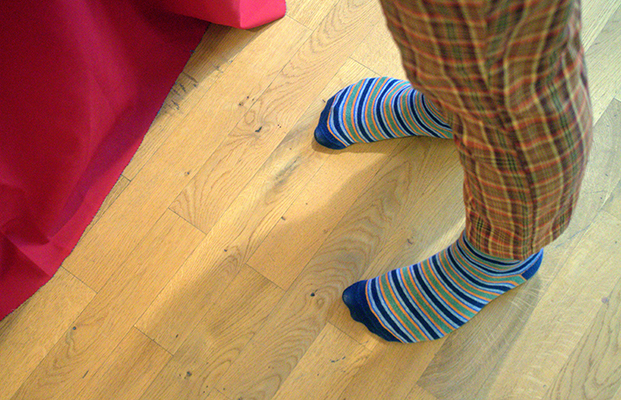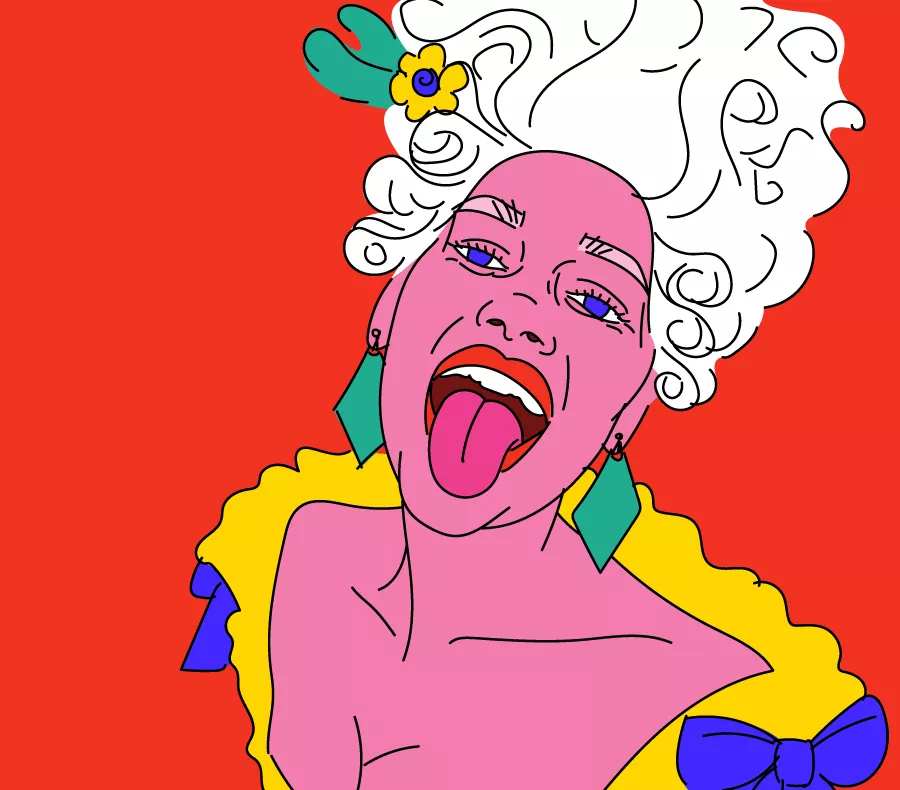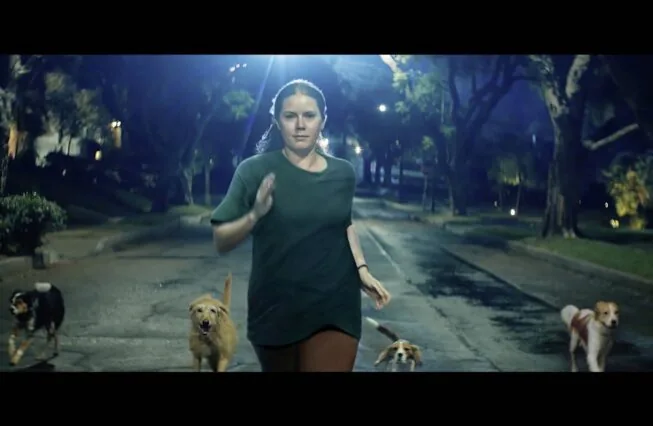In the year of the creepy clown, we thought we’d interview a real clown. Never could we have expected what happened. Norbert the clown reminded that us everybody has a young soul somewhere within us that never leaves us from childhood, that all of us have the secret power of a clown, and he told us how he helped an elderly woman that couldn’t cry in years, learn how to cry again.
Scott Witmer’s daily job is to be Norbert, the Red Nose clown doctor. And while we thought a clown doctor’s job was to simply clown around and dispense jokes to make sick people laugh, clowns like Norbert are carrying out something much more sophisticated. They are trying to connect with another human, and give them the warm feeling that this brings. You know, that feeling when your eyes connect with a strangers and you both smile. Or as Norbert says – ‘a clown interacts with the core young soul of a person’
Here’s the very uplifting and inspiring interview and magical moments that played out in the clown rehearsal room of the Rote Nase home base in Vienna’s 17th district, with a clown named Norbert:
Scott, before he becomes the clown, Norbert
A Clown Doctor’s equipment
Vienna Würstelstand (VW): How did you become a clown?
Scott (S): I saw a small advertisement in a newspaper, which said, ‘looking for hospital clowns.’ When I read it, I knew immediately that, that was who I am. This was in 1993.
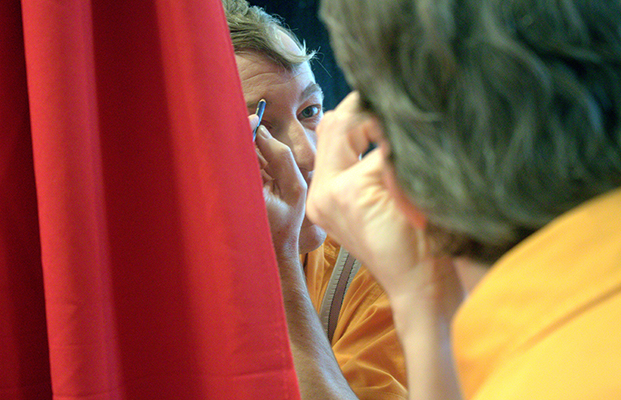
The transition from Scott to Norbert
VW: What does the training involve to become a clown doctor?
S: The Red Nose Clown Doctors have a extensive training program. In this program, there’s all kinds of training we undergo, like those things you would expect, like classic clowning. You learn how to discover your own character as a clown, what the special skills are of your clown character, how to interact with your clown partner (clown doctors always work in pairs), how to interact with the audience, how to create magic and magical moments. Also, we learn basic skills like how do you learn how to stumble or juggle or simple magic tricks. We learn our clown tools. Like a mechanic has a tool belt and knows how to use each tool in it, we pull out a tool to achieve the kind of clowning we want to achieve. We also learn about illnesses, the needs of sick people, and also intercultural differences.
VW: What’s your special skill?
S: My clown loves to sing. I was a singer before I become a clown. My clown also likes to dance.
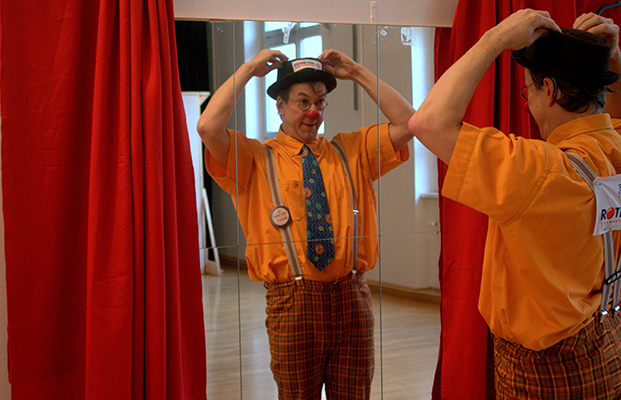
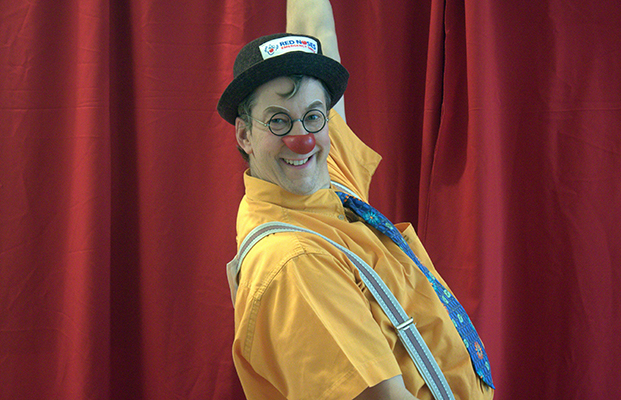
VW: You face some difficult situations – you’re trying to make people laugh in difficult moments in their lives. How do you do that?
S: well, this is one of the main illusions we like to break. Our job is not to only make people laugh. We see ourselves as artists who engage with people who are need of our visit. We create a relationship with these people, and discover moments of humanity, of humanness. So it’s not so much about just making them laugh. If they laugh, this is s sign of a good visit, if they cry, this can also be a great sign.
VW: Are you always able to keep a smile on your face during the visits?
S: No, the clown doesn’t need to be happy. The clown has a wide range of emotions. And a clown having too much fun may not be fun to watch.
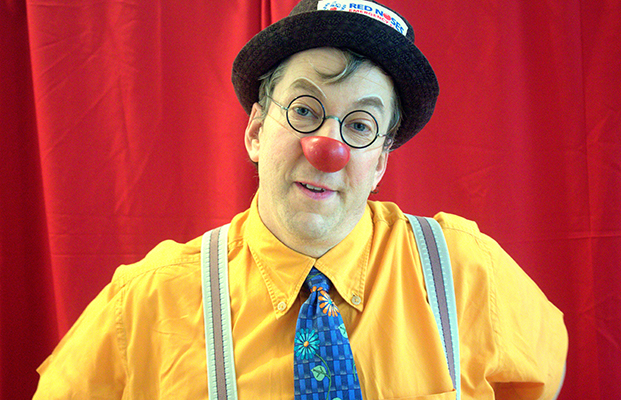
VW: Who are the people that a Clown Doctor visits?
S: We have 4 different types of visits: we visit children and their mothers and fathers, we also visit the elderly with psychological or physical illnesses, we visit people who are recovering from brain injuries, and we also visit refugee children. We also visit elderly people who don’t have the luxury of being visited very much.
VW: Can you describe a visit?
S: For example, a typical visit to a geriatric ward starts with a lengthy conversation with the hospital staff to get the info. we need. We usually take notes of the people we’re about to visit. The next step is we get into costume and forget all of this info. The clown character doesn’t take all of this background information in with them.
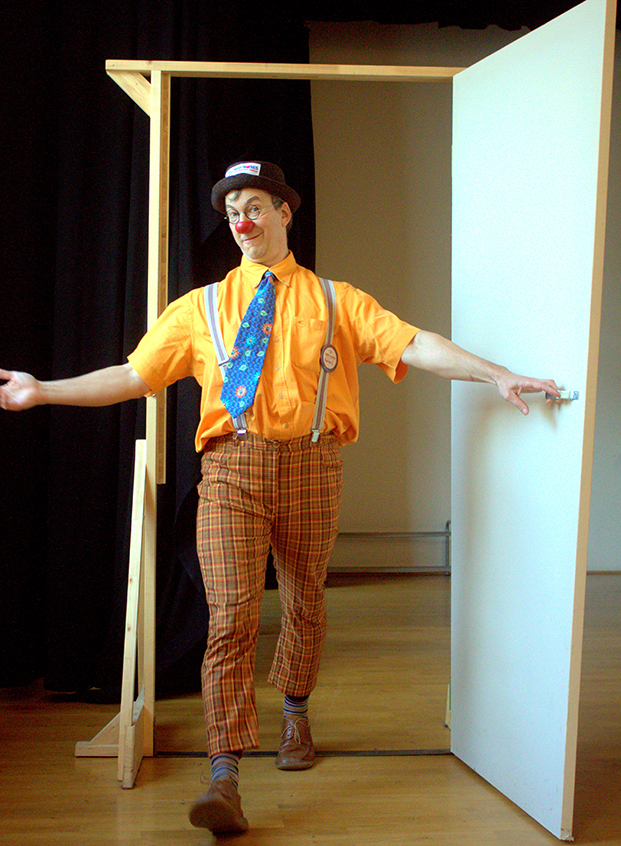
We aim to work with the therapy, but the clown is naïve and open. We engage with each resident or patient personally and on an individual basis. We reach out to each individual person and see ‘who are you, where are you right at this very moment, are you sad or happy, or angry’ – there’s a emotional assessment.
Then we try to create a bit of magic. This might involve music, a dynamic between the 2 clowns or between a clown and the audience. There’s never a plan. Each room we enter is a discovery process. And we might know something about this person, for example, if they had a career in the past, if they have children, or what their interest is, and then we use this to build a connection with the person. And then we create this space that’s like a bubble. And we invite that person into this bubble. It’s really a beautiful thing. Everything becomes part of that bubble, and then you can float.
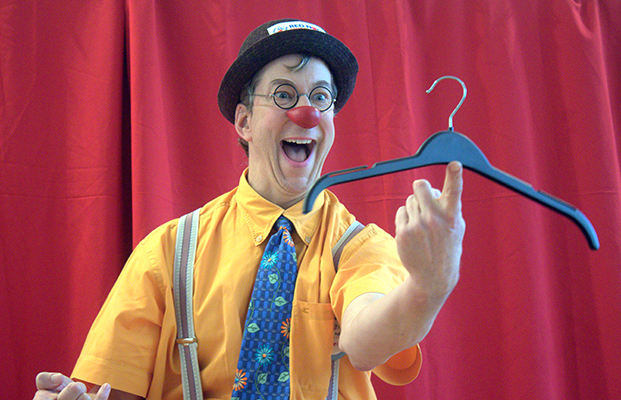
VW: What’s the reaction like from refugee children?
S: This is a very different setting for us as clowns. Sometimes there’s 40 children we’re visiting, with no limitations like a sick child does in a hospital bed, and some of them are carrying real trauma, a trauma deeper than the trauma we experience with the sick children we visit. However, the similarities between our visits far outweigh the differences. I can relate to them just as much as I can an elderly woman, as we’re all human.
VW: You have a very unique job in which you face people in difficult periods of their lives. We’d like to hear a Clown Doctors perspective of life that you’ve learned to live by in your work.
S: That’s a lovely question. The first thing that comes to mind is, we all have a choice on how we want to change our outlook on any given situation. This is what a clown does. A clown can walk into a room and change the energy of the room. Not by forcing it, but by teasing the energy until it changes. I think we all have this option and ability.
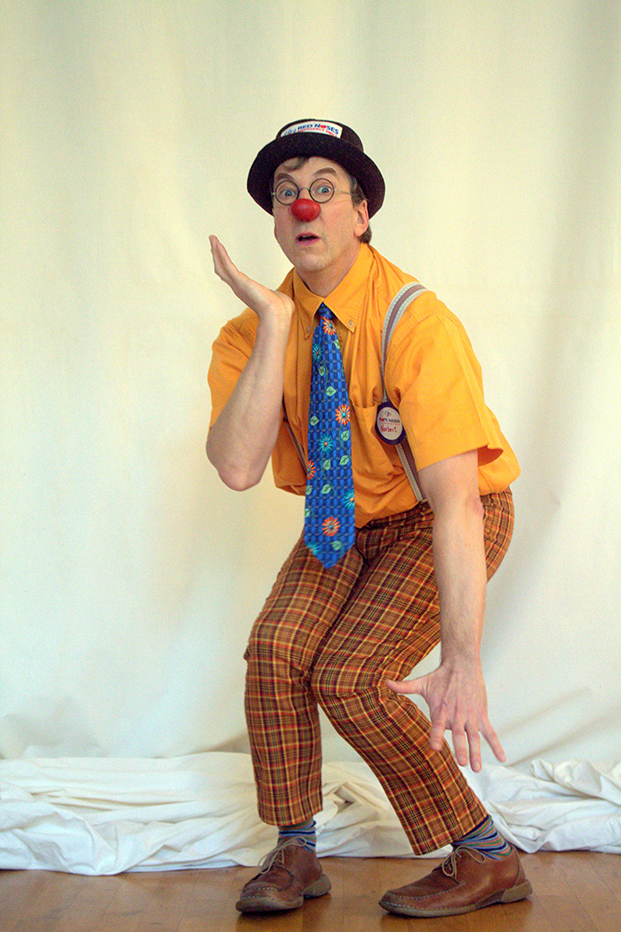
VW: 2016 has been labelled the worst year ever by many. What do you think?
S: I don’t see the value of passing judgement on a year and stamping it with ‘Bad.’ I don’t see how this has more value than the other option which is to say, ‘where are the opportunities?’
VW: As a professional clown, what are your thoughts of the creepy clown phenomenon?
S: I think these individuals are hiding behind a mask and are quite cowardly. It’s unfortunate for the thousands of professional clowns around the world as it makes our job a little bit more difficult once and a while. It’s a shame they abuse this gift and the naivety and innocence of a clown.
VW: What has been your most inspiring day, or inspiring case as a Clown Doctor?
S: I will just take an example form yesterday as there’s something that happens everyday. I was visiting an elderly woman with a psychological illness. As we were talking to her, she told us that the thing that is hardest for her is that she can’t cry. She couldn’t cry.
So we put a red nose in her hands and decided to sing some of her memories into this red nose.
So we sang, ‘In die Berg bin ich gern’ and she started to sing with us. And then she started to cry. (At this point, Scott and I have tears in our eyes and goosebumps on our skin) It was very moving.
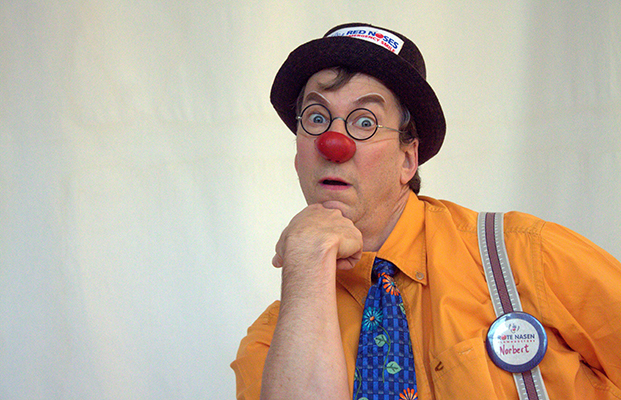
VW: How do you get in and out of character?
S: I think it’s just a decision of how to view the world. And like I said before, we all have this choice.
VW: Do you go back to being a normal person when out of costume then? A normal person just as agitated by certain things as everybody else?
S: Yeah. Go figure.
Word rap:
I say a word and you say what immediately comes into your head …
VW: red
S: blue
VW: children
S: many
VW: 2017
S: balloons
VW: toes
S: fingers
VW: laugh
S: -ter
VW: sad
S: -ness
VW: Vienna Würstelstand
S: Käsekrainer
